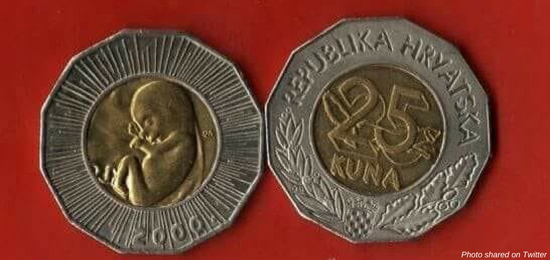To celebrate the new millennium back in the year 2000, the Republic of Croatia minted a coin featuring the image of a preborn child. The fetus – a human being living the first moments of his or her life – is symbolic of new beginnings to the people of Croatia, and therefore was the perfect image to mark the start of the 21st century. Croatia is largely Catholic and abortion is a huge cause of controversy in the nation which holds strict laws against it.
85 percent of Croatians belong to the Catholic faith, and abortion is mostly illegal after 10 weeks of pregnancy. Many Croatians are pushing for abortion to become completely illegal. In 1952, when Croatia was part of Yugoslavia, abortion was legalized. Then in 1974, the Federal Consitution of Yugoslavia stated that the decision of when to have children is a human right and by 1978 a law was established allowing for contraception, sterilization, abortion, and infertility treatments. Thus, essentially declaring that the wants and desires of adults on when and how to create or destroy the lives of their children trump the rights of those children – even their most basic right to life.
CROATIA HONORS THE PREBORN The Republic of Croatia is, undoubtedly, the only nation in the world that has issued a gold and silver coin with the unmistakable figure of a child that has not yet been born. Croatia honors life to be born. #prolife #humanrights #preborn #humanrights pic.twitter.com/3a4ZGGA41k
— Catholic Connect (@ConnectCatholic) July 13, 2018
When Croatia achieved independence from Yugoslavia in 1991, a new Constitution was created which states, “Every human being has the right to life” and outlaws capital punishment. Despite this, abortion remains legal up to 10 weeks after conception. Parental consent must be given if the girl is under age 16. Beyond that, abortion is legal only if approved and the reasoning must be that the abortion is medically necessary (which it never is), that the child has a disability (which is discrimination) or that the mother was raped (also discrimination), or had “intercourse with an incompetent person” (certainly not the child’s fault). The abortion must be approved by a “commission of experts” consisting of a gynecologist and either a social worker or a registered nurse – who are hardly experts at every health condition that can be diagnosed prenatally or every health condition that can affect a woman or whether or not a person is suffering from sexual abuse.
These restrictions, though considered excessive by abortion proponents, are too lenient for pro-lifers who have been fighting for a ban on abortion since the country declared it’s independence. But in 2017, after pro-lifers challenged the abortion law, the Constitutional Court ruled that the constitution allowed for abortion and the head of that court, Miroslav Separovic, said, “It is not up to the Constitutional Court to rule when human life begins.” It was decided that a new abortion law must be created within two years and that the law would not be able to ban abortion but “strike a balance between a women’s right to privacy and the protection of unborn life.” The Catholic Church was said to be taking part in the creation of the new abortion law, however, in March 2018, the Health Minister stated that this was untrue and the Catholic Church, despite the majority of Croatians being Catholic, would not be a part of the abortion discussion.
The good news is that doctors in Croatia are increasingly refusing to commit abortions and the law allows for that freedom. Unfortunately, it may eventually put them at risk of losing their jobs as pro-abortion doctors argue that any doctor who refuses to abort preborn children should be forbidden from working in public hospitals.
READ: Malta is one of the most pro-life countries in the world
Croatians continue to hold out hope that abortion will be banned in their country. In 2016, it was noted that Croatia has the fastest growing rate of new cities involved in 40 Days for Life Campaigns and in 2017, 20,000 people walked in their March for Life including Croatia’s deputy prime minister.
While Croatia’s abortion restrictions seem strict on paper, allowing abortion up until the 10th week of pregnancy could actually make women feel rushed and trapped into making the decision to abort. Most women find out they are pregnant when they are approximately six weeks along, some eight weeks. That pressure could cause women to “choose” abortion and suffer a lifetime of regret. And their preborn child has had a heartbeat since about three weeks gestation. He or she is very much a human being.
It would stand to reason that a country which mints a coin featuring the precious image of a human being in the womb should be a country against abortion, and Croatia largely is. With the country’s growing rate of active pro-lifers and brave doctors who refuse to commit them, it seems this coin is symbolic of how the people of Croatia value life. The coin – which is worth 25 Kuna or approximately $3.49 American – is still in circulation and can be purchased on eBay for about $9.00. While the coin is symbolic of the new beginning the year 2000 brought, it’s also a symbol of a deeper truth that pro-abortion groups around the world ignore. Preborn children are human beings. Science proves it and our subconscious minds know it.







